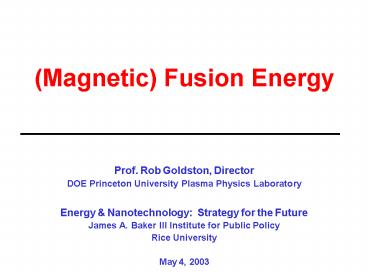Magnetic Fusion Energy
1 / 22
Title: Magnetic Fusion Energy
1
(Magnetic) Fusion Energy
- Prof. Rob Goldston, Director
- DOE Princeton University Plasma Physics
Laboratory - Energy Nanotechnology Strategy for the Future
- James A. Baker III Institute for Public Policy
- Rice University
- May 4, 2003
2
(No Transcript)
3
Fusion is an Attractive Domestic Energy Source
- Abundant fuel, available to all nations
- Deuterium and lithium easily available for
thousands of years - Environmental advantages
- No carbon emissions, short-lived radioactivity
- Cant blow up, resistant to terrorist attack
- Less than 5 minutes of fuel in the chamber
- Low risk of nuclear materials proliferation
- No fissile or fertile materials required
- Compact relative to solar, wind and biomass
- Modest land usage
- Not subject to daily, seasonal or regional
weather variation - No large-scale energy storage nor long-distance
transmission - Cost of power estimated similar to coal, fission
- Can produce electricity and hydrogen
- Complements other nearer-term energy sources
4
Comparison of Fission and Fusion Radioactivity
After Shutdown
1
Fission Light Water Reactor
10-2
10-4
Fusion Vanadium Alloys
Fusion Reduced Activation Ferritic Steel
Curies/Watt (Thermal Power)
10-6
Fusion Silicon Carbide Composite
10-8
10-10
1
10,000
1,000
100
10
Year After Shutdown
5
Fusion in a Hydrogen Economy
- Electricity demand varies strongly during the
day. - Fusion systems have near-zero fuel costs.
- Off-peak operation has low marginal cost.
- Off-peak H2 production from fusion is an
attractive option. - Local production at the power plant.
- Distributed production at refueling stations.
6
CO2 Accumulation is a 100 to 200 Year Process
7
Fusion can Contribute on a Timely Basis
Estimated Total Primary Energy Consumption
Needed new non-CO2-emitting power. 750B / year
market (todays dollars).
World Primary Energy Consumption (TW)
Fusion with growth rate 0.4 / year of total
energy.
650 ppm WRE Scenario
World population growth will be in cities and
megacities, requiring large new power stations.
8
Plasma science also has impacts far beyond fusion
energy in astrophysics, computer chip
processing, space propulsion
9
Magnetic Fusion Power System
10
Progress in Fusion Energy has Outpaced Computer
Speed
And some of the progress in computer chips can be
attributedto plasma science!
11
ITER Provides a Cooperative Opportunity to Make a
Sun on Earth
Science Benefits Extends fusion science to
larger size, burning (self-heated)
plasmas. Technology Benefits Fusion-relevant
technologies. High duty-factor operation.
Goal To demonstrate the scientific and
technological feasibility of fusion energy,by
producing industriallevels of fusion power.
US has had major impact on ITER design 500 700
MW thermal fusion power 400sec 1 hr pulse length
12
ITER Negotiations Europe, Japan, Russia, Canada,
US, China and probably South Korea
- Four sites are on the table
- Northern Japan, Canada (near Toronto), Spain /
France - With the U.S. and China and probably now South
Korea the numbers may add up - Europe has talked about 53
- Japan may contribute more than 10 for ITER
abroad - Canada is working towards a stronger bid
- The key issues for resolution are
- Siting and cost sharing
- Management of a major international construction
project - Risk allocation
13
Advanced Plasma Configurations Address Key
Issues for Fusion Energy
Goal Combine domestic innovation with ITER
science and technology for practical
fusion energy.
14
A Range of Toroidal Magnetic Configurations is
Being Studied Worldwide
Superconducting Stellarator - EU
Large Tokamak EU
Tokamak MIT
New Superconducting Tokamaks Korea, China, India
Spherical Torus PPPL (also EU)
Superconducting Stellarator - JA
Large Tokamak JA
Tokamak General Atomics
15
Three Areas of Technology are Critical for
Magnetic Fusion Energy
16
Three Areas of Technology are Critical for
Magnetic Fusion Energy
- High-heat-flux Components
- Up to 25 MW/m2 heat flux
- Up to 5 MWyr/m2 7x1025 14 MeV N/m2 50 dpa
- Tritium-generating Blankets
- Up to 15 MWyr/m2 2.1x1026 14 MeV N/m2 150 dpa
- Up to 1000 C coolant
- 100 (plus a tiny bit) tritium regeneration
- Magnets Superconducting Normal
- Highest field possible fusion power B4
- High current density in S/C at high field
- j 1000 A/mm2 at 20T would be revolutionary
- Superstrong support structures for high fields
- Improved normal magnets would be revolutionary
- Conductivity copper
- Able to withstand 2 MWyr/m2 20 dpa neutrons
- Low activation (e.g., carbon nanotubes)
17
Low-Activation Variants of Ferritic Steels
Developed for Breeders are Attractive
Fusion-developed steels also have superior
tensile strength, irradiated fracture toughness,
and thermal conductivity.
18
Nanocomposited Ferritic Steel vs. Other Oxide
Dispersion Strengthened (ODS) Steels
19
(No Transcript)
20
Multiscale nanoscience simulation of materials
for fusion
21
International Fusion Materials Irradiation
FacilityA D-Li stripping neutron source to test
fusion materials at realistic He/dpa ratios
- 1/4 of 5x20cm
- Target zone
- 50 dpa/yr
- 5 MW/m2
22
Fusion EnergyAn Opportunity for the Nation
- Fusion is an attractive energy option for the
future. - Progress towards fusion energy has been very
rapid, but is severely limited by budget
constraints. - Japan and Europe are each investing much more in
fusion than the US. - A plan for the development of fusion requires
- Fundamental Understanding
- Configuration Optimization
- Burning Plasmas (ITER)
- Materials and Technology
- Nanotechnology is needed for improved materials
and could have revolutionary impacts through
improved magnet systems.































